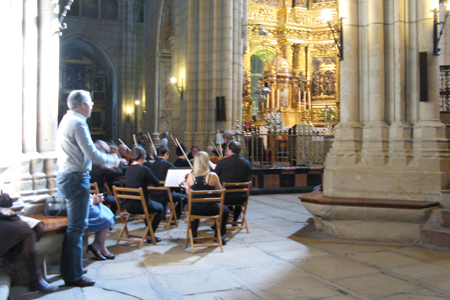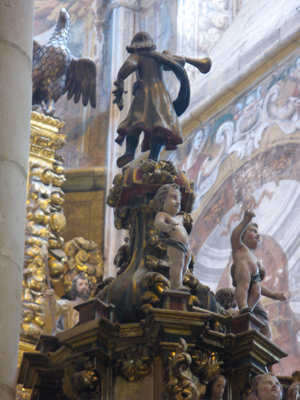| |
 |
 |
 |
| Comment on this report, or find other reports. |
 |
| Our Mystery Worshippers are volunteers who warm church pews for us around the world. If you'd like to become a Mystery Worshipper, start here. |
 |
| Find out how to reproduce this report in your church magazine or website. |
|
|
| 1887: Santa
María de la Asunción, Viana, Navarre, Spain |
 |
 |
 |
Mystery Worshipper:
Augustine the Aleut.
The church:
Santa María de la Asunción (St Mary of the Assumption), Viana,
Navarre, Spain.
Denomination:
Roman Catholic, Archdiocese
of Pamplona and Tudela.
The building:
Built from 1250 to 1329. The richness of the church reflects
the economic and political importance of Viana, which marks
the frontier between the ancient kingdom of Navarre and the
wine-drenched province of Rioja. Santa Maria's Gothic floor
plan is overwhelmed by baroque and rococo altars and carving
everywhere. The nicely-proportioned Renaissance tower and the
strong Gothic layout saves the place from the hysterical drama
of the 17th and 18th century makeover. Even so, you can see
how the retablos and the statues were a great pedagogical tool
for catechizing children and illustrating sermons. As a teacher
from Adelaide remarked, they didn't have overheads, and this
was the best they could do.
The church:
Pope Alexander VI's son Cesar Borgia, who died in 1507 while
single-handedly trying to defend the city during a siege, originally
was buried beneath the middle of the Camino "to be trampled
on by men and beasts," as the bishop ordered. But on the
fifth centenary of his death, Cesar's earthly remains were finally
reinterred inside the church. "Whatever he may have done
in life, he deserves to be forgiven now," the Archbishop
of Pamplona is reported to have said. Who claims that the Church
is heartless?
The neighbourhood:
Viana is in northern Spain. The Camino runs right through the
heart of Viana, passing by the front door of the church. There
are plenty of cafés and darn good restaurants.
The cast: Likely José María Ortiz Sola, the parish priest.
The date & time:
Sunday, 27 September 2009, 12.00 noon.
What was the name of the service?
Parish Mass.
How full was the building?
Potentially holding about 350, the place was packed to the corbels, with standing room only. I suspect that there were 450-500 present, with a good mix of all ages, including a number of adolescents and young people, and perhaps two dozen pilgrims.
Did anyone welcome you personally?
We were hustled into place quickly by an usher as the service was about to begin. A local man helped us stack our backpacks so that nobody would trip over them.
Was your pew comfortable?
I was perched on the base of a pillar by the altar of Santa
Catalina, a bit out of the line of sight of the altar, but only
about 10 metres away from the musicians. There was the wonderful
dancing trumpeter on the pulpit in front of us (pictured below).
How would you describe the pre-service
atmosphere?
Rustling and lots of susurration as people took their seats
and greeted each other. This place was a lot more genteel than
the rough towns of Aragón.
What were the exact opening
words of the service?
"En el nombre del Padre, y del Hijo, y del Espíritu
Santo."
What books did the congregation
use during the service?
I could not see any in the pews from where I was sitting. There were small leaflets with the music of the day listed.
What musical instruments were played?
A professional baroque orchestra, with about 20 or so young
musicians. They had violins, violas, cellos and harps.

Did anything distract you?
I had been walking with a German pilgrim in his 30s for much of the day, and had been trying to get rid of him as he was depressing and edgy and clingy, but to no avail. We walked into the church to have a look around (having lost track of the days of the week, and we were surprised to see that it was Sunday), only to be told to find seats quickly as the service was to begin. The church had filled up so we trotted, packs and perspiration and all, to the gospel side, and sat at the base of a pillar.
Was the worship stiff-upper-lip, happy clappy, or
what?
Unlike anything I had ever seen. Apparently a university baroque
orchestra had been brought in by the council and provincial
government for a concert that afternoon, and it had been determined
that they would play at the mass as well. So along with parishioners
who were there for the principal Sunday mass, there was also
a gaggle of concert goers. Cheerful formality and close attention
both to the music and the service was in the air. A bit of Bach's
First Brandenburg Concerto brought the clergy in; Boccherini's
Passacaglia for the gradual; Caccini's Ave Maria
for the communion; and Boccherini again with his Retirata
for the exit processional. There was no smoke, but a priest
and deacon served along with two older clerics.
Exactly how long was the sermon?
10 minutes.
On a scale of 1-10, how good was the preacher?
8 – More of an address. Perhaps I am being generous out
of gratitude, as his Castilian was clear and distinct.
In a nutshell, what was the sermon
about?
We were told that today's mass featured an orchestra to support
the worship, and we should be grateful to the council for their
courtesy. After a paragraph or two about Our Lady (specifics
not grasped by me), the priest reminded us that it was the season
for the harvest of the grapes. This gift of providence was the
foundation for their prosperity, but we needed to remember that
wine could be a curse as well as a gift. As well, we must be
grateful for the work of the many foreigners in the vineyards
and remember to treat them with respect and brotherhood. We
must put ourselves in their place and think of how strangers
are grateful for a gentle word and the hand of welcome.
Which part of the service was like being in
heaven?
Well, what wasn't?
And which part was like being in... er... the other place?
At one point during the service, my German companion, whom I
had been trying to shake, began to cry. He later told me that
his wife had died that year of cancer, that he was walking for
her, that she loved music, and that he wished that she were
here, and that maybe she was. I felt ashamed and embarrassed
to have been so grumpy toward him.
What happened when you hung around after the service looking lost?
The concert proper was to begin, so we scampered out, lifting our grimy packs to our grimy backs.
How would you describe the after-service
coffee?
Overwhelmed by the experience, my German friend and I walked
into a restaurant and had a tremendous Sunday lunch. A posse
of the musicians were at a neighbouring table. On the way out,
the German went over and thanked them, telling them that their
hard work at practising was rewarded, and that their music that
day had been a gift for him. They were puzzled at the strength
of his emotion, but clearly realized that it came from somewhere
deep, and their response was as gracious as their playing. One
of the cellists (a striking young woman with chestnut hair)
stood and gave us a toast in mixed German and Spanish, to the
effect that it was a privilege for them to play at this church,
the German's sincere remarks gave them much pleasure, and that
they would be grateful if we could remember them in Santiago.
How would you feel about making this church your regular (where 10 = ecstatic, 0 = terminal)?
Well, this chain of events will never happen again, but I liked the feel of the place. Give it a 10.
Did the service make you feel glad to be a
Christian?
I had often been edified by music in services, but never before moved by it in this way. Several times, I held my breath at the wonder of it all.
What one thing will you remember about all this in seven days' time?
Bach and Boccherini's religious music played in context and in worship, not in concert, in surroundings true to the period. And the delight and sorrow in the German pilgrim, and the faces of the musicians as he spoke to them in the restaurant. It all fit together. Time was nothing. We were in a good place.
More Camino reports |
|
|
 |
 |
 |
| We rely on voluntary donations to stay online. If you're a regular visitor to Ship of Fools, please consider supporting us. |
 |
 |
 |
| The Mystery Pilgrim |
 |
| One of our most seasoned reporters makes the Camino pilgrimage to Santiago de Compostela in Spain. Read here. |
 |
 |
 |
| London churches |
 |
| Read reports from 70 London churches, visited by a small army of Mystery Worshippers on one single Sunday. Read here. |
| |
|
|
|
|


